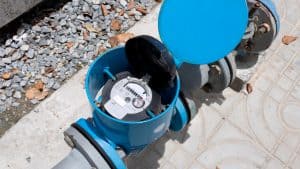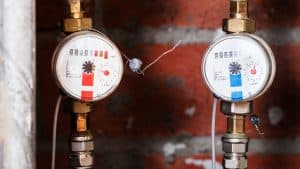H2O Efficiency
Flow Meter Technology – a More Efficient Use of Water
article by Kiara
Water, water, everywhere - but not as much as we might think. Water conservation is a key part of environmental thought and tackling the world water crisis. There’s only so much fresh water in the world, and we need it for so many different applications - growing food, creating pharmaceuticals, and, of course, to drink.
In order to conserve water, we must first measure water usage. To do that, we need the right tools. Flow meters are everywhere, and while they’re often seen as regulatory tools, they can do so much more. But before we dive into how flow meters are used for water conservation, let’s take a moment to understand exactly what flow meters are designed to do.
What is a flow meter?

Volumetric flow meters determine the volume of fluid that passes a certain point in a given amount of time. Generally, it’s expressed in cubic meters per second (m3/s). Flow meters can measure the flow of all kinds of different fluids - including gases - but for the purposes of this post, we’re going to focus on water flow meters.
There are many different types of flow meters - depending on your needs, you might go to a positive displacement flow meter manufacturer, an ultrasonic flow meter manufacturer, or a manufacturer of one of many other kinds of flow meters.
Most people have seen at least one flow meter in their lives - the water meters your utility uses to bill you for water usage are flow meters. They’re usually displacement meters, but they can be another type of flow meter, too.
Why measure water flow?
There are a lot of different reasons to measure water flow, but they usually fall into one of two categories:
To determine how much water is being used
To determine if there are any changes to a closed system
The second category takes a little explanation - it’s mostly used in laboratory settings. When you know a certain quantity of water should be flowing past a point in a given timeframe, changes to the amount of water flowing can be indications of changes in the pressure of the system, the temperature of the water, the amount/types of solids dissolved in the water, and/or other factors.
Water flow meters and efficient water usage
Now that we understand what water flow meters are, we can take a look at how different entities can use water flow meters to make water consumption more efficient.
Governments and flow meters
Governments already use flow meters for all kinds of regulatory purposes. Very dry regions, like New Mexico, employ flow meters to determine if homeowners and business owners are exceeding their water quotas. Governments can also use flow meters to limit agricultural water usage when critical water basins are running low.
While these regulatory uses are helpful, governments can do more to use flow meters for preventive conservation. Cities can, for example, use smart water meters to alert their citizens of any potential leaks in their home plumbing system. This both reduces water waste and improves the lives of home and business owners.
Agriculture and flow meters
Water is essential to agriculture. We’ve already looked at how the government uses flow meters to regulate agricultural water use - but we believe that agribusiness would do well to implement flow meters more often in their own practices.
Data and agricultural science are tightly linked. By implementing flow meters, farmers can get a better idea of how much water their irrigation system is using. Flow meters can also help farmers spot any potential leaks. Too much or too little water can lead to damaged crops - flow meters help prevent this.
Agriculture and a greener world are tightly linked in their own right - flow meters help ensure sustainable food growth and limit water waste.
Commercial business and flow meters
Think about the wide variety of different commercial enterprises that exist - now think about how many of them use water. Pretty much all of them, right?
Golf courses can use flow meters to ensure that every section of the course is watered properly. Office buildings can use flow meters to help detect potential leaks. Flow meters can be used almost anywhere to gather data about how water is being utilized - and that data can be used to make better decisions about reducing water consumption.
In Albuquerque, reducing water consumption has been particularly important in recent years. A plumbing and construction company in the area, Dub-L-EE Construction, has this to say on water consumption and expenditures for commercial businesses: “Running a business is all about cost-benefit analysis – you need to know what type of plumbing and fixtures are going to get you the best bang for your buck, over time.”
In other words, in order to convince commercial businesses to adopt water conservation technologies, like flow meters, we must first convince them that data gathering, leak prevention, and water conservation are worth the investment. We can do this by educating business owners on the benefits of water conservation, and by encouraging utilities and governments to provide rebates to businesses willing to track water usage throughout their business with flow meters.
Residential flow meters

In most cases, residential flow meters should be implemented by the entities providing water - in other words, the water utilities. That said, homeowners can use flow meters for their own purposes if their utility is unwilling or unable to provide smart meters.
By installing a residential flow meter, homeowners can ensure they’re being billed properly by the utility. They can also install leak detection systems throughout their home’s plumbing system. Leak detection systems are, effectively, small flow meters that alert homeowners when there is an unexpected change in flow.
Water conservation is key
Life as we know it cannot exist without water. That makes water conservation an absolutely key part of the green movement. Water flow meters allow us to monitor water usage, collect data to find ways of using water more efficiently, and detect costly leaks.
That means flow meters are key to more efficient water usage - and key to water conservation. By implementing them in more areas, we’ll be taking one more step toward a greener future.
About the author: Kiara is a part of the marketing team at Quik-Therm Insulation. Quik-Therm provides commercial roof insulation solutions that are environmentally responsible, require fewer components, install faster, and cost less.